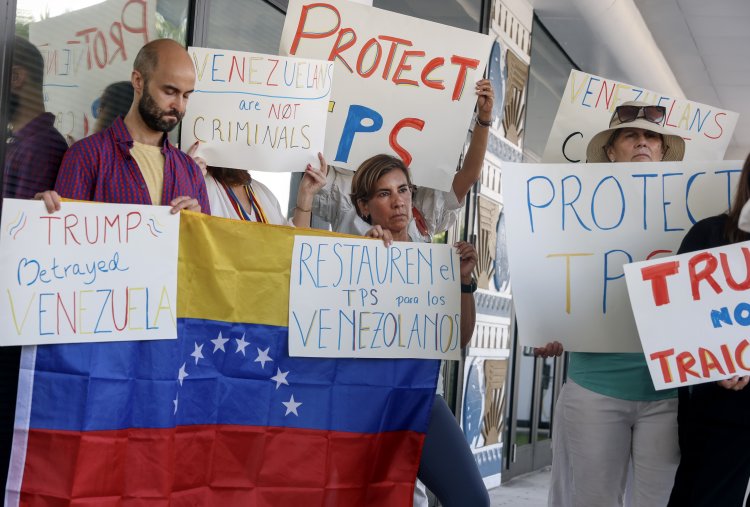Immigration Supporters Overcome by Trump's "Flood-the-Zone" Strategy
Activists have been challenging Trump’s immigration agenda on a case-by-case basis. However, his administration is building momentum as these cases make their way to the Supreme Court.

Activists are preparing for what seem to be protracted court battles against President Donald Trump during his second term. Many are anxious about the actions the administration might take next to push its immigration agenda, particularly as these legal matters reach the country's highest court.
“This is just devastating, I mean it’s just horrible,” said Nicolette Glazer, an immigration lawyer and advocate closely monitoring the legal disputes. “It’s just going to be a complete massacre.”
Since assuming office, Trump has initiated a sweeping crackdown on immigration, ending Biden-era programs and broadcasting a deportation message that advocates say has instilled fear and anxiety in communities nationwide. These extensive actions are part of Trump's plan to implement the largest mass deportation campaign in U.S. history, following his anticipated 2024 victory, which suggests an even more rightward shift in immigration policy.
Thursday brought some cheer to advocates when the Supreme Court ruled that the Trump administration must allow the return of Kilmar Abrego Garcia, a Maryland resident who had been deported to a notorious prison in El Salvador despite a judge’s order preventing his removal due to the risk of persecution he faced there.
This was one of several recent legal victories. A federal district court in Washington extended its injunction against deportations under the wartime Alien Enemies Act through mid-April. Additionally, courts have prevented the administration from cutting legal funding for unaccompanied migrant children.
In a separate matter, a federal judge recently sided with Venezuelan nationals on temporary protected status who were on the brink of losing that status after the revocation by Homeland Security Secretary Kristi Noem in February. The judge issued an injunction to maintain an 18-month extension of TPS while the case is considered.
Yet, despite these victories at the district court level, Trump is “winning the larger war so far,” Glazer stated. “The Trump administration does not appear to be deterred.”
The administration deemed itself victorious this week as a divided Supreme Court lifted the injunction on the Alien Enemies Act, thereby vacating a trial judge’s order that had broadly blocked all deportations linked to Trump’s use of this 18th-century law.
Legal analysts have compared the Alien Enemies Act decision to a split verdict — Trump can again use the act for deportations, provided immigrants retain the avenue to challenge their detention orders. Nevertheless, the administration hailed this as a “massive legal victory” and a “smackdown” of the district court, according to White House press secretary Karoline Leavitt.
“A GREAT DAY FOR JUSTICE IN AMERICA!” Trump tweeted on Truth Social.
Venezuelans have begun filing petitions in New York and Texas contesting their deportations under the Alien Enemies Act. A Texas judge recently blocked deportations once more by issuing a temporary restraining order for those defendants, paving the way for further challenges and appeals concerning the wartime law.
Simultaneously, the administration has issued termination notices to immigrants with parole status who accessed the Biden-era parole programs for countries such as Cuba, Haiti, Nicaragua, and Venezuela, which could affect over a million individuals and expose them to deportation risks.
“It’s overwhelming,” remarked Venezuelan activist Adelys Ferro, who has been advocating for TPS. “It’s exhausting, it’s disheartening, it’s painful, and I’m not going to lie, last night I cried.”
The TPS case is currently pending a ruling at the Ninth Circuit Court of Appeals, but activists anticipate that an emergency appeal to the Supreme Court will likely follow.
“Everybody is afraid,” Ferro added, who serves as the director of the Venezuelan-American Caucus. “I’ve been in contact with thousands upon thousands of TPS beneficiaries, and I feel their pain, their uncertainty, their fear.”
DHS Assistant Secretary Tricia McLaughlin stated that the district court's decision to halt the end of TPS protections represents “yet another example of an activist judge trying to obstruct President Trump’s agenda.”
“Secretary Noem will continue fighting to return integrity to the TPS system, which has been abused and exploited by illegal aliens for decades. We will return TPS to its original status: temporary,” McLaughlin declared.
The White House did not respond to multiple requests for comment on this issue.
Venezuelan activist Cecilia Gonzalez Herrera, a plaintiff in the TPS case, expressed her concerns about a relentless push to deport individuals with TPS. She believes that the revocation of status and arrests of Venezuelans marks an early step toward fulfilling the ambitious deportation numbers Trump has promised.
Immigration and Customs Enforcement has focused on the Venezuelan gang Tren de Aragua in its raids across the nation, using the gang’s presence as part of the justification for the revocation of TPS protections for all Venezuelans. Polling indicates that Trump’s initiatives to enhance border security and increase deportations continue to resonate positively with voters.
“Half of this country elected Donald Trump, and unfortunately, that is working out — the narrative that wants to criminalize many of us, despite us proving ourselves day to day that we are hard-working, honest people,” Gonzalez Herrera said. “It’s hard to be a Venezuelan living in the U.S.”
Legal experts point out that fear of deportation could prompt individuals to leave voluntarily — even those who are legally present. The administration has encouraged self-deportation among those losing parole status, advocating for them to utilize the new CBP Home app to indicate their intent to depart.
“It’s a matter of telling people that they can and letting people’s fears fill in the rest of the blanks themselves,” remarked Dara Lind, a senior fellow at the American Immigration Council. Lind emphasized that individuals on TPS have other means to remain in the U.S. and secure relief once their status expires.
Advocates like Ferro and Gonzalez Herrera pledge to endure the uncertainty until protections can extend beyond the TPS injunction.
“This is not one of those moments where we should just start running like chickens without a head and freaking out,” Gonzalez Herrera stated. “We need to be very laser-focused.”
DHS has indicated that if it prevails in its appeal regarding TPS, the 18-month extension could be revoked swiftly. Up to 600,000 Venezuelans might lose their ability to live and work in the U.S.
Yet, through the appellate process, these individuals could find themselves embroiled in legal battles for months, if not years.
“The fight is worth it,” Ferro asserted. “But I don’t think the fear is going to go away.”
Anna Muller for TROIB News












